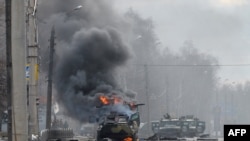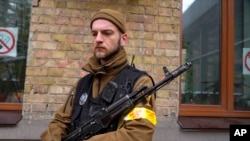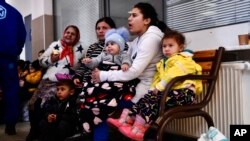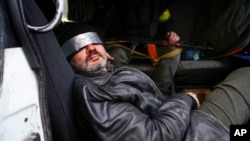Fears are mounting that Russian forces will turn more to targeting critical civilian infrastructure and mount indiscriminate shelling as the defenders of Kyiv maintain their resistance and hold ground despite redoubled Kremlin efforts to subjugate Ukraine’s capital.
Some critical civilian infrastructure has already been hit and the Ukrainian military said it intercepted a missile heading for a nearby dam, which if breached could have caused major flooding of low-lying districts near the Dnieper River.
Russian forces also targeted a radioactive waste disposal site in Kyiv, Ukrainian authorities say.
“I think today we've seen a shift in Russian targeting towards critical civilian infrastructure, greater use of MLRS [multiple rocket launchers], and artillery in suburban areas,” tweeted Michael Kofman, an expert on the Russian military at CNA, an American defense research organization.
“Unfortunately, my concern that this was going to get a lot more ugly and affect civilians is starting to materialize,” he added.
In the dam incident, the Ukrainian military said it managed to shoot down a Russian missile heading toward the Kyiv Reservoir dam Saturday.
“If the dam is destroyed, the flood will lead to catastrophic casualties and damage, including flooding of residential areas in Kyiv and the suburbs,” the Infrastructure Ministry said on Telegram.
Water experts say if the dam north of the city is breached, it could trigger a cascade effect, causing other key dams to fail. There are even concerns that a nuclear power plant at Zaporizhzhya, about 550 kilometers southeast of Kyiv, could be affected.
Russian forces Saturday targeted an oil depot southwest of the city at Vasylkiv as Ukrainian forces repulsed a Russian assault on the capital.
Local authorities say Ukrainian forces are battling saboteurs and Russian special operations forces units who have infiltrated the capital. The Ukrainian government has reported 198 civilian deaths, including children, since the Russia's invasion, but they caution the numbers could be higher. Ukrainian authorities say at least 1,200 civilians have been injured.
Six people, including a 7-year-old girl, were killed in Russian shelling in Okhtyrka, in Sumy Oblast in northeastern Ukraine, Governor Dmitry Zhivitsky said Sunday. And in the south of the country the Russian military launched drones strikes in Odessa, according to Serhiy Bratchuk, head of the regional administration.
The Ukrainian military says it has inflicted heavy losses on Russia, saying its forces have managed to destroy 16 warplanes, 18 helicopters, 102 tanks, 504 armored vehicles and a Buk-1 missile system. They estimate they have killed 3,000 Russian soldiers and captured 200. VOA is unable to vouch for the accuracy of the claims.
Sunday morning the Ukrainians blew up a bridge on the northwest of Kyiv to try to hinder Russian forces.
Ukraine presidential adviser Mykhailo Podolyak told reporters that while a Russian delegation had arrived in Gomel in Belarus for peace talks, Ukrainian President Volodymyr Zelenskyy has rejected a Russian offer of talks in Belarus on Sunday. Podolyak said Zelenskyy is open to negotiations elsewhere — the Ukrainians have suggested Warsaw, which is being refused by the Russians.
Zelenskyy described the fighting overnight in Kyiv and across the country as “brutal” in a statement Sunday. He said Russian occupying forces are “attacking civilian areas” where there is no military infrastructure. He said Russia is now “attacking everything,” including ambulances.
As worries mounted in Kyiv of a shift in Russian targeting from mainly military infrastructure, locals Sunday reported fierce street fighting in Ukraine’s second-largest city, Kharkiv, where overnight shelling of residential districts preceded the entry of Russian ground forces.
Despite the Russian breach of Kharkiv, local Ukrainian commanders say they will continue to resist.
“There has been a breakthrough in light equipment including in the central part of the city,” Oleg Sinegubov, the head of the Kharkiv regional administration, announced, urging local residents to stay in shelters. He said Russian troops were still being blocked amid heavy fighting.
As in Kharkiv and Kyiv, so too elsewhere in the country defiance remains high — with resistance symbolized for many by a video posted on social media showing a Ukrainian civilian in Bakhmach in northern Ukraine attempting to stop a Russian tank by pushing against it.
In the video, the man first climbs on to the tank before jumping down and attempting to push it back, after that he kneels in front in a desperate bid to stop its advance. VOA cannot confirm the authenticity of the video, nonetheless it is one of many posted that Ukrainians point to as inspirational.
Ukrainian forces have notched up some significant successes. Zelenskyy aides confirmed that a convoy of Chechen special operations forces was intercepted near Hostomel and wiped out. Ukrainian forces have downed a cruise missile fired by a Russian Tu-22 strategic bomber from the territory of Belarus, Valery Zaluzhny, chief commander of the armed forces, said Sunday.
For civilians in cities and towns under siege — and even in towns unaffected directly by the fighting — getting basic goods and staples is becoming increasingly difficult. Many stores have closed, and supplies are difficult for owners to maintain. Village stores seem better supplied, being able to stock up with local produce, as witnessed by this VOA correspondent.
Seventy-two hours since the Russian invasion, Western experts estimate 80% of the country is still in Ukrainian hands, with around half of the forces Russian leader Vladimir Putin deployed along Ukraine’s borders now in action.
Franz-Stefan Gady, an analyst with the International Institute for Strategic Studies, a think tank in London, says the Russians are having to throw in more second-echelon units because “Ukrainian forces by and large are fighting orderly delaying actions; morale remains very high; air-defenses still operational; air force remains active.”
He says Ukraine’s mechanized forces are managing to mount counterattacks and that a race is on for Ukrainian forces to beat an orderly retreat from the East, where the bulk of Ukrainian forces have been deployed, to cross the Dnieper River and establish fresh defensive positions where possible. The Russian tactic seems to be to avoid losing contact with major Ukrainian units and to encircle major cities, as they are trying to do with Kyiv, and probe for weaknesses.
He, too, worries about the likelihood of mounting civilian casualties.
“Expect very heavy fighting and a noticeable increase in Russian ground-based mass fires to break Ukrainian resistance. This will be absolutely devastating for the civilian population, if caught in crossfires,” he tweeted.
The U.N. Refugee Agency said Sunday that more than 200,000 Ukrainians have fled to neighboring countries. Tens of thousands more are waiting on Poland’s borders to enter, with many more trying to make it across the country, as witnessed by this VOA correspondent during a journey from Kyiv to Lviv that took two days.
As blasts and explosions echoed around Kyiv, Zelenskyy, wearing olive green military-style clothing, assured residents of the capital that he remains with them.
“I am here. We will not lay down any weapons. We will defend our state, because our weapons are our truth,” he said. “Our truth is that this is our land, our country, our children and we will protect all of this,” he added.
The country’s 44-year-old leader also said the country’s steadfast resistance has “derailed” a Russian plan to establish a puppet state in Ukraine.








